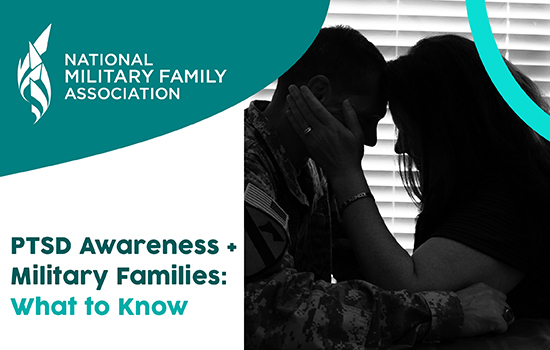Post-Traumatic Stress Disorder Awareness: What Military Families Need to Know

It feels like every military drama or TV series shows only service members who have Post Traumatic Stress Disorder (PTSD). In fact, if you search “PTSD Awareness Day” online, an image of a soldier pops up.
While we certainly do not want to make light of this diagnosis, not every service member experiences PTSD. Moreover, an entire generation of brave men and women should not be defined by PTSD – whether they suffer from it or not. Since June 27th is PTSD Awareness Day, let’s shed light on what it is as well as resources that could assist you if you or a family member lives with PTSD.
What is PTSD?
Post-Traumatic Stress Disorder is a mental health problem that can occur after someone experiences or witnesses something shocking, dangerous, scary, or even life-threatening.
Paul, an Army veteran with five combat tours, was experiencing PTSD but did not reach out for help immediately. He recalls feeling irritated, angry, and miserable. His love for his family pushed him to get the assistance he needed, and he took the brave steps necessary to strengthen his resolve and ability to cope with his trauma.
“My family means the world to me, and if I hadn’t gotten help, what would have become of me?” he shared. “What would have been of them?”
Longtime NMFA partner Wounded Warrior Project understands just how critical it is for our heroes to get the help they need, right when they need it. The WWP Program Directory showcases the many ways warriors and their loved ones can access support, no matter where they are in their PTSD journey.
“There’s only two options if you don’t get help,” Paul said. “Either your family implodes, or your do.”
When to Reach Out
If you suspect you might be experiencing PTSD, you are able to self-screen HERE.
Sometimes love, care, and assistance are not enough. If you feel your family is struggling, it’s time to speak up. If you or a loved one needs help, here are some avenues to consider:
- Veterans Crisis Line / Military Crisis Line – 24/7, Military Crisis Line, online chat, and text messaging provide free confidential support service members, including members of the National Guard and Reserve, Veterans, and their loved ones: 800-273-8255/Press 1
- General Lifeline – for those in emotional distress or suicidal crisis: 800-273-8255
- Give An Hour – confidential counseling services
- Military Health System – If you or someone you know is struggling with PTSD, seek help immediately.
You Are Not Alone
Mental health, TBI, PTSD – even though we hear these words more often than ever before, we don’t always know what they mean or what to do with them. And when your family finds itself dealing with any of these, especially PTSD, it can feel isolating.
If your family is navigating life with a service member’s PTSD, consider applying to attend one of our Operation Purple Healing Adventures retreats. This free, weekend-long time away is a way to rest, relax, and learn how to help each other rekindle what it means to be a family unit, all while connecting with other military families whose experiences are similar to yours.
There is zero shame around reaching out for help. It is one of the bravest things you can do.




